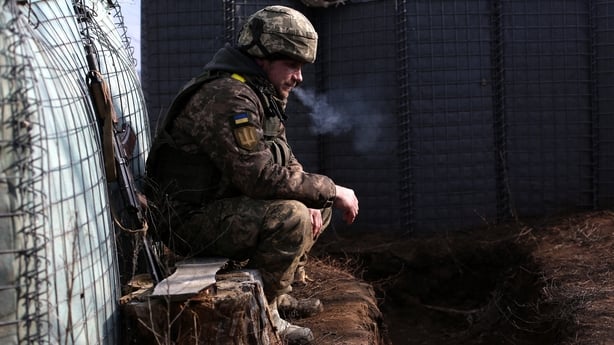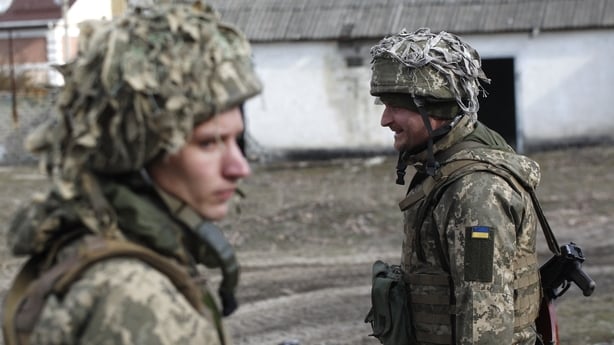Ukraine's parliament has imposed a national state of emergency aimed at helping to forge a response to the threat of a Russian invasion.
The measure was overwhelmingly approved on the same day that Moscow began to evacuate its Kyiv embassy and Washington stepped up its warnings about the chances of an all-out Russian attack.
"The situation is difficult but remains completely under our control," Ukraine's security and defence council secretary Oleksiy Danilov told politicians ahead of the vote.
The state of emergency allows Ukraine's regional governments to adopt heightened security measures that range from tighter ID and vehicle checks to more stringent policing.
It came into force at midnight on Wednesday and it is due to stay in place for 30 days.
"Intelligence from all our foreign partners - as well as our own intelligence and analysts - show that it would be impossible to take over our country without first destabilising the domestic situation," Mr Danilov said.
The state of emergency applies to all parts of Ukraine except for two Russian-backed eastern separatist regions.
In addition to the 30-day state of emergency, the Ukrainian government has announced compulsory military service for all men of fighting age.

Ukraine's parliament, cabinet and foreign ministry websites are down. Government websites have experienced several outages in recent weeks, which Kyiv has blamed on cyber attacks.
Moscow denies planning an invasion and has described warnings as anti-Russian hysteria. But it has also taken no steps to withdraw the troops deployed along Ukraine's frontiers.
Kyiv mayor Vitali Klitschko told reporters that "mass events and strikes" would be banned across the country under the new rules.
He said specific measures for Kyiv include checkpoints at the main entrances into the capital as well as "special controls" at train stations and airports.
"We must be ready to defend our homes, families, city and country at any moment," Mr Klitschko said.
Read More:
Donetsk and Luhansk: Ukraine's breakaway republics
US sanctions Russia for 'beginning' invasion of Ukraine
NATO warns Russia readying for 'full-scale attack' on Ukraine
Russian President Vladimir Putin's recognition of the eastern provinces' independence on Monday sharply ramped up fears of an imminent war.
Mr Putin has signed decrees allowing the deployment of Russian "peacekeeping" forces into rebel territories to back up the independence claims.
The Russian leader said on Tuesday that his decision to send in the troops will "depend on the situation on the ground".
But Russian state television has been filled with allegations from rebel leaders in the past few days accusing Ukrainian soldiers of launching deadly and unprovoked attacks against civilians.
Ukraine firmly denies the allegations.
The rapidly escalating tensions have forced US officials to ramp up their warning about the looming threat of an attack from at least 150,000 Russian forces believed to have encircled Ukraine.
Fighting across the eastern frontline surged last week after a months-long lull.
Ukraine has reported the death of six soldiers and one civilian in government-held regions in the past four days.

Ukraine city of Lugansk
Monitors from the OSCE pan-European security body say the current level of fighting is particularly heavy in the rebel Lugansk region.
It reported 1,182 ceasefire violations in Lugansk in a daily tally released earlier, and covering new breaches recorded through late Tuesday.
The Kremlin has said the heads of eastern Ukraine's breakaway regions have asked Mr Putin for "help" to "repel aggression" from the Ukrainian army.
Mr Putin's spokesman Dmitry Peskov said they "asked the president of Russia for help in repelling the aggression of the armed forces in Ukraine." The statement was carried by Russian state news agencies.
Mr Peskov said Mr Putin had received a letter from the heads of the Donetsk and Lugansk regions, which he recognised as independent this week.
"The actions of the Kyiv regime testify to the unwillingness to end the war in Donbas," Mr Peskov quoted the letter as saying.
He said the heads of the regions had asked for Mr Putin's help "on the basis" of friendship treaties they signed with Moscow this week.
The friendship agreements Mr Putin signed with the rebels opened the door to the presence of the Russian army on their territory.
We need your consent to load this rte-player contentWe use rte-player to manage extra content that can set cookies on your device and collect data about your activity. Please review their details and accept them to load the content.Manage Preferences
Meanwhile, European Union leaders will hold an emergency summit on Thursday to discuss what to do next over Russia's recognition of the two breakaway regions in eastern Ukraine. The bloc today also approved a first, limited round of sanctions.
The EU sanctions include blacklisting more politicians and curbing trade between the EU and the two breakaway regions.
"It is important that we continue to be united and determined and jointly define our collective approach and actions," EU Council chief Charles Michel said in a letter inviting EU leaders to Brussels.
He said a special European Council meeting would be held at 7pm.
Mr Michel said the agenda of the meeting would include discussing "how we protect the rules-based international order; how we deal with Russia notably holding Russia accountable for its actions; how we will further support Ukraine and its people."
The impact of the first round of sanctions is likely to be limited, as Western governments are for now preferring to keep the much larger sanctions packages that they have planned in reserve should the crisis escalate.
The measures, formally approved by EU governments earlier, include restricting the Russian government's ability to raise capital on the EU's financial markets "to limit the financing of escalatory and aggressive policies," the EU said in a statement, without giving details.
The EU has also decided on an import ban on goods from the breakaway regions, restrictions on trade and investment, a prohibition on supplying tourism services, and an export ban on some goods and technologies.
The EU chose not to sanction Vladimir Putin himself but instead blacklist all members of the lower house of the Russian parliament who voted in favour of recognising the breakaway regions, freezing any assets they have in the EU and banning them from travelling to the bloc.

